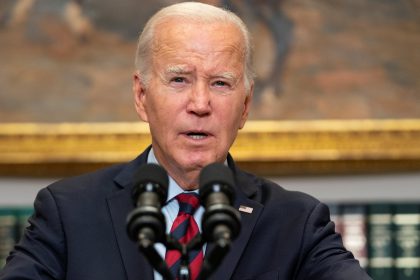Bidenomics Means Increasing ‘Worker Power,’ Advisor Argues

WASHINGTON — The success of President Joe Biden’s promise to breathe new life into the American working and middle class will hang on the administration’s ability to build up the power of workers, according to a group of economic experts. They say to be successful it will need to counteract decades of American policy and economic policy.
Most analysts seem to agree that the American middle class is vanishing and that inequality is growing.
Pew Research Center has said that the percentage of Americans in the middle class has shrunk from 61% in 1971 to 51% in 2019.
In that time, pay for the typical American worker has fallen.
Between 1979 and 2017, for example, the wages of 90% of American workers grew slower than the average economic growth in the country despite their productivity increasing, with wealth floating towards the top wealth holders, according to a report from the Economic Policy Institute, a prominent D.C.-based progressive economic think tank.
The sluggish growth in pay for most American workers is the fault of legislative inaction and decades of laws that limited worker power, a group of economists supporting the EPI report argued this week.
Among other things, the report argued that the Black-White racial wealth gap in America can be “entirely explained” in terms of excessive unemployment between 1979 and 2014.
Speaking from his office at the White House, Jared Bernstein, a member of President Biden’s Council of Economic Advisors, praised the EPI report for its emphasis on worker power and connected it to the White House’s economic approach.
A refusal to account for worker power blindly accepts historical injustices and contemporary inequality, he argued.
“Any model of the labor market that leaves out bargaining power is not only fatally flawed in an analytic sense, it’s politically flawed, implicitly accepting embedded inequalities with racial and gendered implications,” Bernstein said.
Consequently, an attractive quality of the EPI report, he said, is that it calls for worker solidarity across racial and gender lines.
“Any alleged equilibrium that accepts Black unemployment rates that are consistently twice that of White rates is obviously no equilibrium at all,” he said, speaking of theories that accept cyclical unemployment, which is unemployment attributed to economic forces.
The president also recognizes this, according to Bernstein.
In May, Biden said that the administration wanted to achieve what economists call full employment, which occurs when job-seekers who want to work and are able to do so are employed. In other words, no cyclical unemployment.
“We want the—the companies to compete to attract workers,” Biden had said, adding, “That kind of competition in the market doesn’t just give workers more ability to earn a higher wage, it gives them the power to demand to be treated with dignity and respect in the workplace.”
Bernstein indicated the speech was particularly noteworthy because it connected wage pressure to full employment and referenced the power that full employment gives workers.
That speech showed that the president has put rising wages front and center in his Build Back Better agenda, the administration’s recovery plan, Bernstein said.
Supporters of the report view themselves as trying to correct decades of American economic policy.
The EPI report, which triggered high-profile coverage when it was first published about two months ago, labeled the slow growth of most American wages as “wage suppression” rather than “wage stagnation” because, it said, putting the breaks on American wages was the intentional outcome of American policy during the last few decades.
According to the report, part of the reason this happened was a failure to act legislatively.
Saturday marked the 12th anniversary of the last federal minimum wage increase, for example, the longest period without an increase in American history. And another EPI piece, published last week, observed that the minimum wage has lost 21% of its value since Congress last raised the wage.
In 1968, when the minimum wage was at its highest point, the country also saw a reduction in racial wealth gaps, the EPI report argued.
Similarly, according to that report, passing the Raise the Wage Act of 2021 would mark a “step in the right direction.” The act, introduced in January, has appeared to have stalled out in the legislature and the report commented that Congress has failed to do its job.
More than a refusal to act, however, the main EPI report argued that intentional policies have done harm to the American worker.
According to the report, policy choices, including austerity macroeconomic policies, anti-union measures, the undermining of the minimum wage and other worker protections, policies that allow employers to set contract terms such as the inclusion of forced arbitration agreements, and corporate-driven globalization have slashed worker’s job security, quality, and ability to command pay. Those choices set up an unequal power dynamic disfavorable to workers.
Unequal power harms freedoms, weakens democracy and civil participation, increases inequality and race and gender inequality, Lawrence Mishel, one of the co-authors of the report said on Thursday.
Mishel said that employment law, policy, and economic analysis need to “center” themselves on the reality of unequal bargaining power.
“The point is to emphasize the fact that this is not something that just happened,” Mishel said. “It’s something where there were conscious decisions made to make it happen.”
Thursday’s event was part of the Unequal Power Initiative, a three-year EPI initiative that has attempted to explain why policy and economic analysis needs to account for unequal power in the workplace. According to the initiative website, it attempts to shatter the assumption that the relationship between employers and employees in the U.S. is a relationship of equals.























